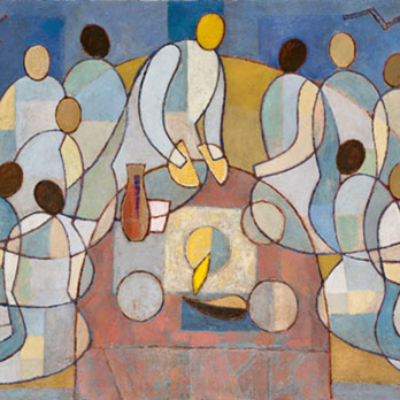
Hapag ng Pag-ibig ni Joey Velaasco
Psalm 23:1-3,5-6
Ezekiel 34:11-12, 15-17
1Corinthians 15:20-26, 28
Matthew 25:31-46
Doing Mission in the Peripheries of the Society and of the Church
It has been one month and 10 days, to be exact, already since Fr. Efren N. Reyes, MJ and I arrived in Tangos, Navotas City. The Missionaries of Jesus assigned us here to start a mission. We are renting a small studio-type apartment. Houses are very close. We can hear the steps of the passers-by and the daily gossiping of our neighborhood. We do not have parish, but a family-owned chapel where we gather to celebrate the Holy Eucharist. We call our insertion here as Mission Station. It is the first time of the diocese to have a set-up like this, instead of a parish, and we are the first missionaries who started the program. In the words of the bishop, we are the Buena mano. In our first few days of stay here, we went around to see the place and meet some people. Navotas is said to be the fishing industry of the Philippines. I can see people transporting volumes of bagoong for the market. Fisherfolks go for fishing at 5:00 in the morning, and return home before noon time. People then invest banca. Huge bancas would cost thousands of pesos up to 7 million.
Tangos is one of the biggest barangays in Navotas with 40,000 populations. It is also the last barangay of Navotas. There are many children in our place. Some even are still awake late in the evening chatting with their friends along the street, and they disturb those people who sleep early including Fr. Efren, whose bed is just meters away. I have also discovered that people here are very fond of images and statues of religious icons. I can see in their houses huge statues of Jesus, Mary, Joseph, Sto. Niño, St. Roque, St. Raphael, and other saints. During the Eucharistic Celebration, they get their statues from their houses and place it on the altar. Sometime, Fr. Efren is invited to say mass in our nearby parish few meters from our apartment. I go with him and I assist him. In the parish, near the altar, the statue of Christ the King is placed in preparation for the Solemnity of Christ the King. The statue wears a golden crown, elegant red robe, and a baton with a cross sign. In many medieval cathedrals, we can also see the figure of Christ throned in glory.
Today, we celebrate the Solemnity of Christ the King. It is also the end of the calendar year of our church. Meaning, next Sunday is the first Sunday of Advent Season. We are nearly approaching the birth of our Savior. The gospel from St. Matthew tells us about the last judgment where Jesus separates the sheep and the goat. The sheep will place on his right, while the goats on his left. The sheep are those who feed the hungry, give drink to the thirsty, welcome the stranger, cloth the naked, visit the sick and the prisoner. We call these the traditional Seven Corporal Works of Mercy including burying the dead. The goats are those who failed to do what the sheep have done. Very surprising, we may say, that the judgment of Jesus lies on responding the poor and needy. To be saved is not just to pray faithfully, to have annual confession, to participate in the Holy Eucharist, etc. Of course, these are all necessary for the salvation of our souls. But, the gospel of Matthew is telling us now that the final judgment is based solely on what we have done or what we failed to do for one another. Jesus is in the poor and needy. To serve them is to serve him. We have to remember that we are made according to his image and likeness (Gen. 1:26).
Bishop Pablo Virgilio S. David, the bishop of the Diocese of Kalookan, is very strong to his commitment to go to the peripheries where people are ignored, neglected, abandoned, and have not been reached out by the church. That is why he is inviting religious congregations, including Missionaries of Jesus, in his diocese to respond to the new paradigm of doing mission in the diocese. He is also planning to have more mission stations in the diocese. So far, there are three mission stations I know. So, the bishop is very serious to serve the biggest number of people in our society today, the poor. Bishop David then stresses that these people are the peripheries of our society, and, sadly, also the peripheries of our church. They are the peripheries of our church today because they do not have access to the sacraments, which are essential to the salvation of our soul. He is very much willing to spend money to rent a house just to reach out the poor, and even if we do not have a church building. In Tangos, we are holding Eucharistic Celebration in the streets. We will not build a church made of stone, but church made of people.
We are now also in the Year of the Clergy and the Consecrated Persons. It is of great challenge as shepherds to look after the welfare of our sheep. During the opening of the Year of the Clergy and the Consecrated Person of the diocese last November 18, 2017, Fr. Benjamin E. Alforque, MSC reminds the clergy and the religious to be truly shepherds of Christ’s flock and to be a Church of Poor. Fr. Alforque cited some concrete examples. He said that the clergy and the religious are so privileged. When a clergy or religious is in crisis, they go for a retreat and spend thousands of pesos, while poor people do not have such opportunity. When people have seen a clergy or religious sweeping, people would tend to say, ̏Father∕Sister, don’t you have somebody to do sweeping for you?” Fr. Alforque reminds the parishioners not to spoil their priests and religious sisters.
Fr. Efren reiterates the words of Bishop David, “Our presence in the Mission Station in Tangos, Navotas is to give flesh to the Gospel.” And that’s we are trying to do in Tangos. So far, we try to make sure that people have access to the sacraments anytime without imposing fix amount of stipend. One time, we blessed the dead newly born baby. As missionaries, we are joyfully journeying with the people of Tangos in their joys and sadness with the guidance of Jesus, the true Servant King.
Bro. Jay-AR D. Roferos,mj
49 S Roldan Street
Tangos, Navotas City


 Prov. 31:10-13, 19-20, 30-31
Prov. 31:10-13, 19-20, 30-31 Psalm 63:2-8
Psalm 63:2-8 Ang mga pagbasa nati ngayon Linggo ay nagbibigay ng mga aral kung paano maging isang mabuting lider. Sinasabi sa evanghelyo na ang tinutukoy dito ay ang mga tagapag-patupad ng kasulatan o mga guro ng batas. At higit sa lahat ang responsibilidad ng isang lider sa kanyang mga nasasakupan. Ayon sa isang iskolar ng Bibliya ang buong chapter ng 23 ay isang “religious polemic” na hinabi ng may-akda ng ebanghelyo
Ang mga pagbasa nati ngayon Linggo ay nagbibigay ng mga aral kung paano maging isang mabuting lider. Sinasabi sa evanghelyo na ang tinutukoy dito ay ang mga tagapag-patupad ng kasulatan o mga guro ng batas. At higit sa lahat ang responsibilidad ng isang lider sa kanyang mga nasasakupan. Ayon sa isang iskolar ng Bibliya ang buong chapter ng 23 ay isang “religious polemic” na hinabi ng may-akda ng ebanghelyo